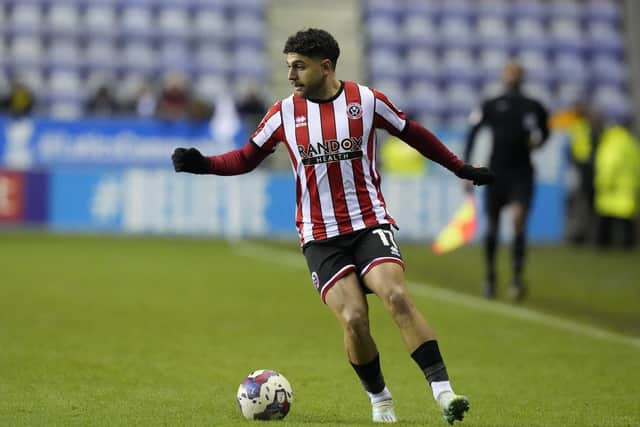Sheffield United: The reasons behind Reda Khadra's troubles laid bare, as he joins Birmingham City
and live on Freeview channel 276
The player looked crestfallen. Paul Heckingbottom appeared sympathetic, placing a consoling arm around his shoulder as he trudged off the pitch. But then Bristol City’s Nigel Pearson, for reasons known only to himself, decided to furnish the media with his own take on events - telling journalists after the visitors’ fortuitious victory that the Germany under-21 international, who he had tried to sign, was guilty of being difficult to manage and not putting a shift in. Or words to that effect. Little wonder the south-west was not among the destinations seriously considered by Khadra’s agent when it became clear he wouldn’t be spending the season in South Yorkshire as initially planned.
Although every player has their foibles, Heckingbottom’s attempt to blame himself for Khadra’s exit suggested he didn’t actually agree with Pearson’s take on the youngster’s character. However, being substituted less than 35 minutes into what proved his fifth and final start for the club did make it abundantly clear that, despite being scheduled to spend the entire campaign at Bramall Lane, Khadra would be heading for the exit door at the first available opportunity.
Advertisement
Hide AdAdvertisement
Hide AdNevertheless, the seeds of the 21-year-old’s departure had been sown long before his excruciating experience two months ago. Suggesting otherwise would be to ignore the fact that conversations were already taking place, among reporters and supporters alike, that Khadra would return to Brighton and Hove Albion when the transfer window reopened.
So why has someone whose capture was hailed as a genuine coup when it was confirmed over the summer failed to spark at United? What are the true reasons behind their failure to get the best out of Khadra, who sealed another temporary switch, this time to Birmingham City, earlier today? Although both Khadra and United’s coaching staff must accept their share of responsibility, one suspects circumstances beyond either’s control are ultimately to blame for a situation which has seen the attacker misfire so badly.
When Khadra was unveiled following protracted negotiations, United briefed that he was more of an attacking midfielder than out and out forward. With Heckingbottom also drafting in James McAtee and, to a lesser extent, Tommy Doyle to compete with Iliman Ndiaye in this area, one suspects he was concerned Sander Berge would be sold before the summer market closed. When the Norwegian remained, partly through accident and partly through design, this meant Khadra’s opportunities were always going to be limited. Even more so when Ndiaye began displaying the form which would later see him travel to the World Cup with Senegal. Entering this weekend’s game against Stoke City having claimed nine goals and seven assists since August, Ndiaye is effectively undroppable right now as Heckingbottom’s side, second in the Championship and nine points clear of third, chase a place in the Premier League next term.
As a result, Khadra has enjoyed precious few opportunities to showcase the talent which persuaded United to insert an option to buy clause into the agreement they struck with Albion. He has taken part in only 16 percent of the minutes available to him and never made back to back starts. Khadra, who made one as a wing-back at the height of the injury crisis which threatened to derail United’s campaign, could be forgiven for feeling aggrieved at this. Particularly when, having scored the winner at Swansea City after being introduced as a substitute, he remained on the bench when United faced Preston North End shortly afterwards. When the time comes to reflect on where things went wrong, Heckingbottom might privately regret taking that decision. But, in fairness to him, Khadra had not made himself indispensable in the same way as Ndiaye or, to a lesser extent, McAtee given the progress he has made of late.
Advertisement
Hide AdAdvertisement
Hide AdUnited’s preference for a 3-5-2 formation also presented Khadra with a problem. Right from the off, with Berge still in situ, it was difficult to envisage exactly where he fitted in; something which, although Heckingbottom will never admit so publicly, lends further weight to the theory espoused earlier.


Nevertheless, before his confidence eroded, Khadra must ask himself if he did enough to force a change of tack. Not only during matches but also on a daily basis in training. For whatever reason, despite being a polite, engaging and interesting interviewee, the answer is clearly not. Because Heckingbottom has shown in the past, with McAtee and Oli McBurnie, that he is prepared to be patient and make big calls if the case to do so becomes irresistible.
What is certain is that cutting short Khadra’s stay makes sense for all parties concerned. Given the constraints upon his budget, in part introduced because owner Prince Abdullah bin Musa’ad bin Abdulaziz Al Saud is in talks about relinquishing control, Heckingbottom does not need to be spending money on someone he is going to use sparingly. It can be better used elsewhere, bolstering a frontline which is suddenly short of experienced options because of injuries to McBurnie and Rhian Brewster.
Khadra, as he demonstrated during a placement with Blackburn Rovers last season, is too talented to be left in the stands. Nor were Albion gaining anything from the arrangement either. In fact, they were probably losing out as his value began to diminish.
A parting of the ways was sensible for everyone.
